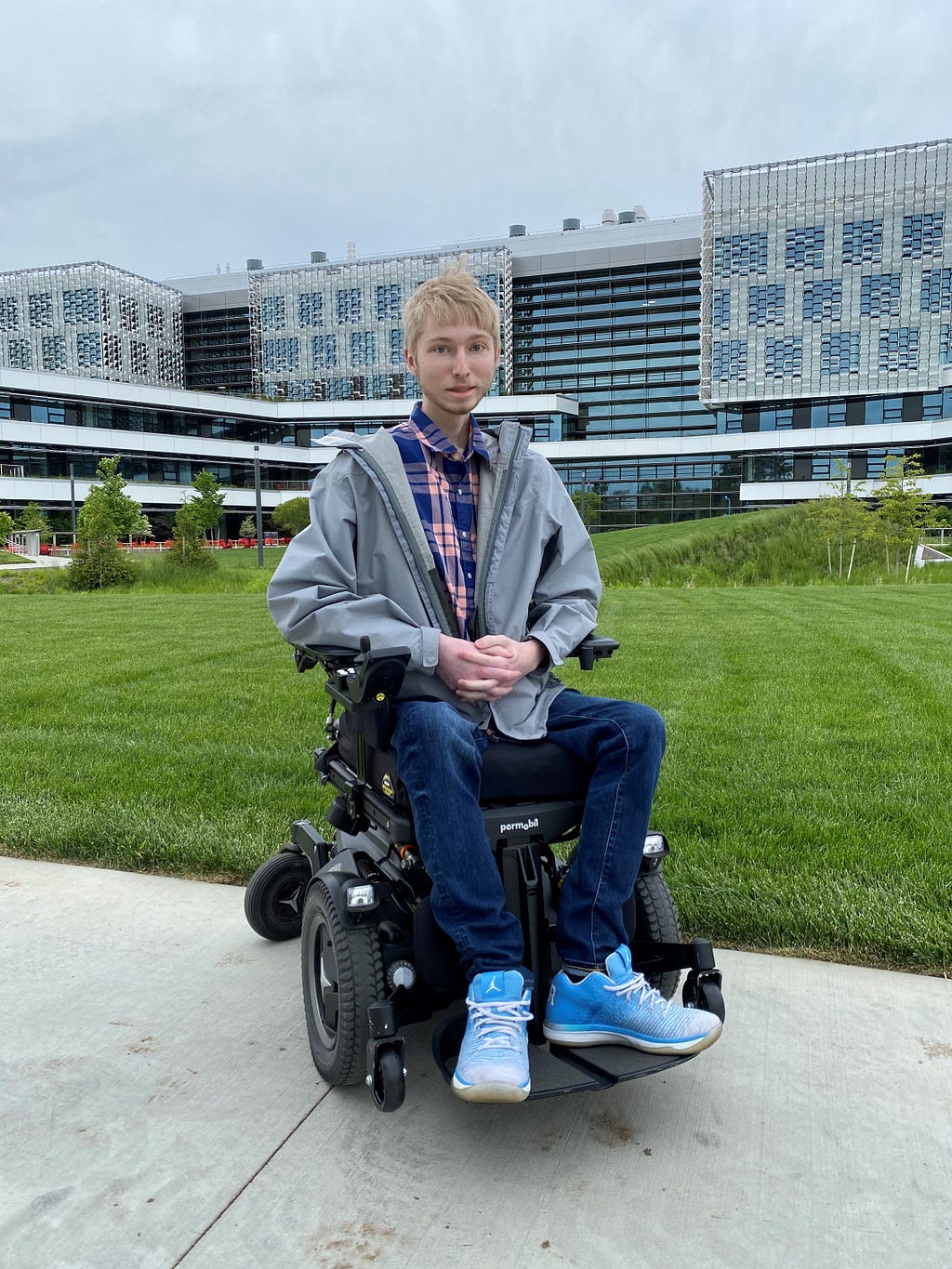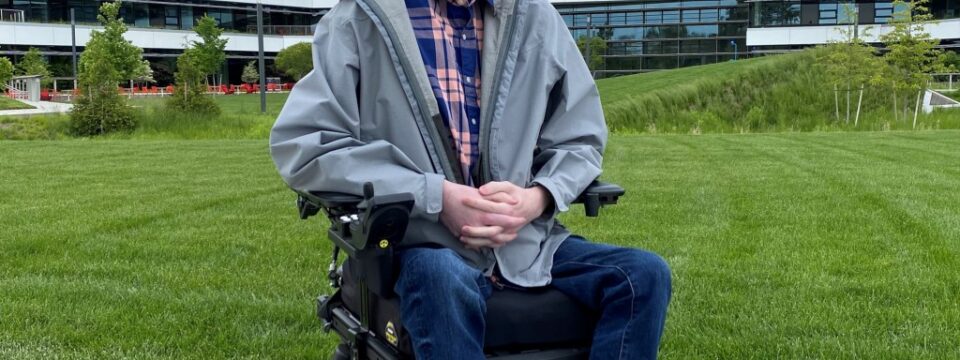Unstoppable: How Jonathan Huml Has Redefined Success While Navigating Society With Facioscapulohumeral Muscular Dystrophy

I don’t mind speaking about my physical condition. I appreciate people who, after establishing a basic interpersonal connection with me, are curious about my experience and perspective. On that note, I get stopped in public all the time by strangers whose sole reason to speak to me is to ask about the wheelchair. I find, on average, these conversations are unproductive. Perhaps I run into a few characters and get a few good stories here and there, but it’s rare.
As a part of our “Unstoppable” series, I had the pleasure of interviewing Jonathan Huml.
Jonathan Huml is a 23-year-old student from Durham, North Carolina. After graduating from the University of North Carolina at Chapel Hill with his bachelor’s degree in mathematics and statistics, he is now pursuing graduate study at Harvard University. He hopes to obtain his PhD in applied mathematics.
Thank you so much for doing this with us! It is really an honor. Our readers would love to get to know you a bit better. Can you share your “backstory” with us?
I can segment my life almost in half: pre and post diagnosis. I was officially diagnosed with facioscapulohumeral muscular dystrophy (FSHD) during my sophomore year of high school. FSHD is one of the most common forms of muscular dystrophy. People with the condition typically experience muscle weakness that starts in their face, arms and shoulders before advancing to the lower body. There are no treatments available to slow or stop the disease’s progression.
Before my symptoms began, I was an active kid who enjoyed Boy Scouts, school, and sports. The diagnosis came at a time when most of my peers were figuring out who they were and what life is all about. On top of that, I was also facing a lot of change and realities associated with my diagnosis. In college, I delved into my love of mathematics and science, which is what brings me to Cambridge, MA today.
Do you feel comfortable sharing with us the story surrounding how you became disabled or became ill? What mental shift did you make to not let that “stop you”?
Having been diagnosed about a month after I turned 14, I didn’t have the foresight or maturity to digest the implications of my diagnosis. I suppose it helped to be naive or stubborn enough to not know or care about my new reality, though I wouldn’t recommend that others employ a similar strategy in the long run.
More than anything, I’m wired for competition. It’s a bit ironic that I should also have this physical difficulty wired into my genes, as if to take on a challenge that nobody (not even myself) wants to touch, if only to prove it can be conquered. Taking FSHD as a test instead of a tragedy has helped.
Can you tell our readers about the accomplishments you have been able to make despite your disability or illness?
I’m not sure I have much to write home about in the accomplishment category yet at age 23, but I’m most proud of the personal principles I’ve built up over the years in part due to, not despite, my disability. I know from experience that the legs you stand on (and the ground beneath them) aren’t guaranteed. That principal eventually manifests itself themselves as actions if the experience behind them is vivid enough, which beget accomplishments.
What advice would you give to other people who have disabilities or limitations?
I believe that most of the advice we need we already know either consciously or subconsciously yet deny regardless. Nothing is more difficult than to take advice we don’t want. I suspect the best advice any of us could get is to take our own advice.
None of us are able to achieve success without some help along the way. Is there a particular person who you are grateful towards who helped get you to where you are?
I’ll cheat and highlight three people instead of one : my mother, my father and my grandfather. I’m grateful for their support, in every sense of the word, during my life. But even before my time, they made consistent and highly non-trivial sacrifices to give me the opportunities I have in front of me now. My ego would like to tell you I’m in Cambridge pursuing my dreams because of my inherent ability or persistence, but most of my success is likely due to support from my family.
How have you used your success to bring goodness to the world?
As I’m just beginning my career, my research has had very little impact thus far. However, if I had to look back ten years as a future version of myself, I would say everything I’ve done up to this point prepared me to contribute to radically changing how we treat rare diseases in the pharmaceutical process. Math is the most powerful language we have, and computation is just (very fast) symbol manipulation. Humanity as a whole hasn’t exploited even a tiny fraction of this potential, and the healthcare sector especially lags behind. I want to help build that bridge.
Can you share “5 things I wish people understood or knew about people with physical limitations” and why.
I will mostly try to speak to my own experience as a wheelchair user since I know “disability” covers a wide range of experiences:
I don’t mind speaking about my physical condition. I appreciate people who, after establishing a basic interpersonal connection with me, are curious about my experience and perspective.
On that note, I get stopped in public all the time by strangers whose sole reason to speak to me is to ask about the wheelchair. I find, on average, these conversations are unproductive. Perhaps I run into a few characters and get a few good stories here and there, but it’s rare.
I enjoy (tasteful) jokes about the wheelchair. It’s an absurd situation and deserves to be poked fun at if you can do it the right way. But please, “Don’t get a speeding ticket in that thing!” does not get funnier the thousandth time around.
Disability is contextual. Imagine your home is at the bottom of a deep well whose insides were completely flat and smooth, and your worth was assessed on your ability to climb out of that well. You’re powerless until I give you a ladder or a rope. Design is key. Public infrastructure, transit, etc. is all designed by humans, and we have the ability to eliminate or exacerbate certain disabilities by simple design choices.
In books or movies, we tend to like or be more engaged by characters who cause things to happen in the story as opposed to reacting to things that happen to them. Thus, I try not to lean into “disability as an identity” because I find it too reactionary and reductive. I’m trying to get from A to B like anyone else. Hopefully B is better than A, but it doesn’t matter how you start at A if it isn’t up to you.
Can you please give us your favorite “Life Lesson Quote”?
Marcus Aurelius: “Look well into thyself; there is a source of strength which will always spring up if thou wilt always look.”
We are very blessed that some of the biggest names in Business, VC funding, Sports, and Entertainment read this column. Is there a person in the world, or in the US whom you would love to have a private breakfast or lunch with, and why? He or she might just see this 🙂
Elon Musk, hands down. He’s the reason I got into math and engineering.
Thank you so much for the time you spent doing this interview. This was very inspirational, and we wish you continued success.
Unstoppable: How Jonathan Huml has redefined success while navigating society with… was originally published in Authority Magazine on Medium, where people are continuing the conversation by highlighting and responding to this story.
